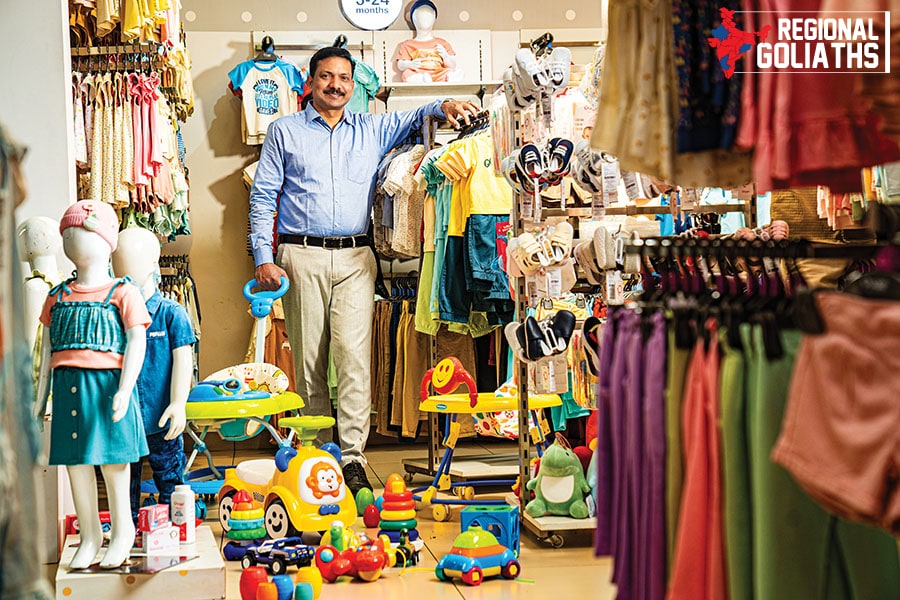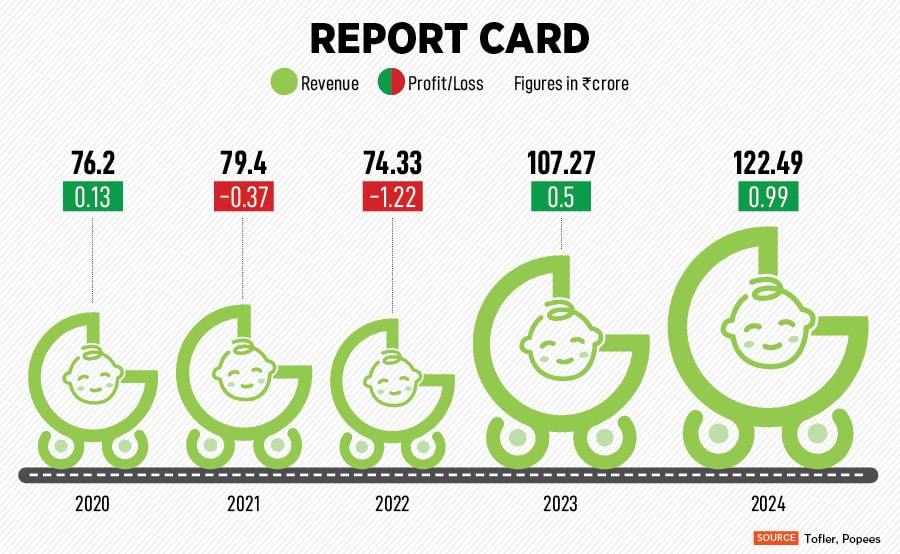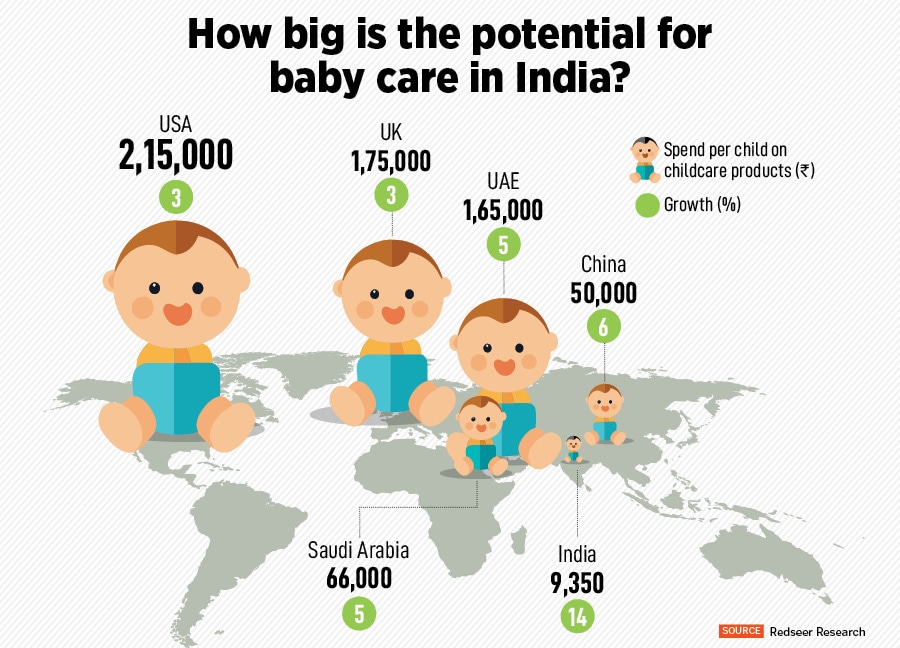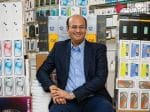Popees: The baby care brand from Kerala taking on global rivals
Shaju Thomas quit being a journalist to build Popees Baby Care into a ₹100-crore company that sells everything that babies might need
 Shaju Thomas, MD, Popees Baby Care
Image: Mexy Xavier
Shaju Thomas, MD, Popees Baby Care
Image: Mexy Xavier
If it hadn’t been for a kind manager at Canara Bank in Malappuram district of Kerala, Shaju Thomas would have probably continued being a journalist.
It was around 2005, and Thomas had wanted a loan of ₹10 lakh from the bank, the only SME (small and medium enterprise) branch in his district, to keep his entrepreneurial venture going. The manager, impressed by the 26-year-old’s perseverance, finally decided to take a gamble on him, even though his predecessor had thought otherwise.
Three other stores, all in the Middle East, are being readied this year, which will see Popees go head-to-head with some of the world’s leading baby care brands in malls across Dubai, Abu Dhabi and Sharjah. “I am a believer in Indian cotton being the best,” Thomas tells Forbes India from his office in Thiruvali in Kerala. “Indian manufacturing is also the best. That gives me the confidence. I am obsessed with quality, and that’s at the centre of everything we do. Money is only secondary.”
Last year, Popees posted annual revenues of ₹122 crore and is now setting sights on a topline of ₹250 crore by 2025, before growing to ₹1,000 crore by 2027. The brand sells garments between 18,000 kg and 22,000 kg a month and employs over 1,400 people at its two factories in Kerala and Karnataka. “I am in this business not to make huge gains and profits,” says Thomas, managing director of Popees Baby Care. “We are in the business of baby care, and we must be very careful about everything we do because it involves babies. What I want is satisfaction at the end of the day.”

Last year, Thomas and his wife, Linta Jose, acquired a majority stake in Chennai-based publicly traded Archana Software Limited and renamed the company as Popees Cares Limited. Now, the privately held Popees Baby Care will merge with Popees Cares Limited, before raising private placements, as the company targets aggressive growth in the coming years.
“This year, we are not being very aggressive,” Thomas says. “We want to focus on the listing and merger. We also want to premiumise our collections because our customer profiles are changing. There are more premium customers coming into the market. What we are focussed on is an Ebidta margin of between 34 and 38 percent.” Ebitda refers to earnings before interest, taxes, depreciation, and amortisation.
India’s childcare product market is expected to grow between 13 and 14 percent annually to ₹5.4 lakh crore by 2028, with younger parents focusing on branded apparel and consumables, according to a report by Redseer Consultancy. It also helps that India is the world’s most populous country, and has one of the highest birth rates globally, with 16 births per thousand people, almost 1.5 times that of developed countries. A growing Tier II and III market only adds to the potential for companies such as Popees.
“Global brands carry with them the momentum and visibility that has been built over decades, which translates into trust as well as aspirational value,” says Devangshu Dutta, founder and CEO of market research firm, Third Eyesight. “But in many cases their pricing is higher than what would be affordable for most Indian consumers. Therefore, there is space for Indian companies to create strong brands that address both factors, trust and value.”

Taking the Risk
Thomas has always had an entrepreneurial streak in him and began venturing out on his own after school. Much of that, he says, is hereditary, coming from a family that had been in business, supplying rubber to the likes of MRF. Passionate about photography, Thomas had set up a small studio in Nilambur, his hometown in Kerala that is known for its teak wood, after his schooling.Simultaneously, he studied economics before going on to finish his diploma in journalism from the Calicut Press Club in 2000. “Nobody wanted to study economics back then,” Thomas says. “Now it’s in huge demand. But I realised the importance of studying concepts such as scarcity, demand, and supply, now.”
After his graduation in journalism, Thomas picked up work with the Malayalam newspaper, Mangalam, and was soon posted to the hills of Wayanad. Around the same time, he invested in a baby care shop in Manjeri, a town near Kozhikode in Kerala. “I knew there was potential in the sector,” Thomas says.
Being an investor made him aware of the nuances involved in the baby care segment. To begin with, there were no brands, and clothes were often brought in bulk from garment manufacturing units and sold in the state for as little as ₹5. “Very often, these clothes would come in big cartons with naphthalene balls and smelled of sulfur,” Thomas says. “And regardless of that, they sold like hot cakes. Sometimes, people would come from hospitals after childbirth, pick up these clothes, and make the newborn wear them.”
That’s when Thomas realised the massive underlying opportunity in manufacturing good quality, branded clothes for children. “There were big brands for everybody except kids,” Thomas says. He soon packed his bags and went off to Tirupur in Tamil Nadu, India’s then-thriving garment manufacturing capital, to understand how he could venture into the business. With him, he also carried a few pieces of child wear that he had sourced from friends abroad, as a reference for the quality of the product that he was looking to make.
“I was thinking both domestic and international,” Thomas says. But Tirupur was something of a rude shock. Thomas found himself in a market near the railway station, with tiny shops, that had their stitching units outside, from where clothes were dispatched to various states under different labels. “When I enquired with them, they asked me if I wanted to sell domestic or international,” Thomas says. “If it was domestic, I had to buy from there. If it was international, I had to have a minimum order quantity. It was the first time I had heard of that concept.”
Also read: How MN Jaganath and A Balaraju turned Dairy Day into Karnataka's top ice cream brand
But Thomas wasn’t startled. Instead, he found a supplier, who would meet his demand for quality, and soon began working with a minimum order quantity, which is usually the minimum number of units a business is willing to sell to a customer in a single order. He also turned down an offer to join a television news channel, IndiaVision, much to the disdain of his family who had wanted him to remain a journalist.
Starting his own business also came with its own set of challenges. For one, in an era when customers didn’t bother about branded clothes for their kids, and when cheaper alternatives were easily available, Thomas’ products were significantly expensive. He could only sell for ₹60 what was otherwise available at ₹6.
“People in the Malabar region have a mindset to help others,” Thomas says. “Shops in the region started keeping my products. That gave me confidence.” Thomas also realised that he needed to set up a factory in Kerala if he had to make timely deliveries as business was slowly picking up steam, and shipments from Tirupur took time.
Saviour at the Bank
Setting up a small factory was no cheap affair. His family had already been opposed to the idea of doing business, which meant Thomas now had to turn to banks to raise capital. “I made a project report, and submitted it to the bank,” Thomas says. It was a branch where his father, a businessman, had a loan limit of ₹1 crore. “I wanted ₹10 lakh. But the manager wasn’t convinced by my business plan. He asked me ‘why don’t you start a curry powder business’ since people always want food. I told him babies are born every day and clothes for them were essential too.”But his plea fell on deaf ears and was finally sanctioned a loan for ₹1 lakh without collateral. With his personal savings of another ₹4 lakh, he bought machines from Chennai. “All I knew was that if I set out to do something, I will complete it,” Thomas says. He soon set up a small factory, combining a few rooms in Thirunelly in Kerala. The idea was that the raw material would come from Tirupur, and the workforce in Kerala would do the final stitching before it was dispatched.
Thomas, however, was still desperate for working capital to keep the business running. It was around this time that a new manager had come to the branch and Thomas would visit him every day to pitch his business. “I used to tell him about my ambitions,” Thomas says. “I was particular about cleanliness and having everything in order and would invite him to my factory.” Finally, after much persuasion, the manager visited the factory and was quite impressed. “Within two days, he added another ₹9 lakh to my loan, and that’s how I started.,” Thomas says. “If that hadn’t happened, I would have shut down.”
With the additional funds, Thomas soon began expanding and selling products across Kerala. By 2005, Thomas was married, and his wife also joined him in the business, helping design products. His background in journalism also helped, as he began putting advertorials in evening newspapers about the importance of buying high-quality kids’ wear. By 2010, Popees changed its logo, a turning point in its growth trajectory. That splendid run lasted until 2019, Thomas says, when Popees would only be able to meet 70 percent of its demand and had already been distributing in markets including Punjab and New Delhi.

Covid-19, the Disruptor
It was around this time that Thomas began toying with the idea of its retail stores. “My cycle was very long,” Thomas says. “Once you reach a certain turnover, you need to reduce your time. That’s how I thought of my showroom. Until then they were sold in other retail outlets.” The yarn for Popees clothes comes from organic cotton farmers in Ahmedabad, and the manufacturing is done in Tirupur, based on designs given by Popees. Only the final assembly and last round of stitching is done in its factory.“I was scared to foray into retail,” Thomas says, “My business was already at about ₹74 crore, and I was worried if stores would stop taking my products. With floods in Kerala and Nipah virus in Kozhikode, there was uncertainty already in the market.”
Still, Thomas took the plunge and set up a proto store outside the company’s headquarters. That was a success, with customers flocking to the store and buying in bulk, with the store generating ₹5 lakh in sales. In 2019, Popees opened its first retail outlet in a 1,500 sq ft showroom in Kochi, before starting in Trivandrum and Bengaluru.

But Covid-19 came as a dampener. In early 2020, Thomas had almost finalised a deal with a private equity (PE) major to raise ₹100 crore for a 26 percent stake sale. The due diligence had been completed, and everything seemed on track before the PE firm pulled out after uncertainties about the future. Thomas had also met actor Aishwarya Rai Bachchan to bring her on board as the brand ambassador for Popees.
With Covid-19 shutting down operations, Popees turned to manufacturing masks and clothes for children, all given for free in Kerala during the pandemic. Simultaneously, though, it went on an expansion spree with its retail outlets going from some six stores to over 30 in two years. Today, the company has 70 stores, 35 of which are franchise-invested, company-operated while the others are franchise-owned, franchise-operated. Twenty more stores are expected to be completed this year, with the company gearing up for a launch in the UK and Australia, apart from the UAE.
There is also a focus on omni-channel distribution, with Thomas saying that as much as 30 percent of his clientele chooses to buy products online. The company already sells on ecommerce platforms. Today, it has the capacity to make 5 lakh garments monthly.
Alongside, it has moved to manufacturing everything from baby oil and soap to baby wipes and fabric wash. The product range includes toys, baby soap, body wash, shampoo, lotions, and towels, among others, although a significant share of the sales still come from clothes. “I have three children, and much of what we did was also keeping them in mind,” Thomas says.
That’s why he prefers not to give discounts on products, instead focusing entirely on the quality. “I am obsessed with product and quality,” Thomas says. “We can also provide discounts after raising our markups significantly. But we don’t want such high margins.” The company has now hired a new designer in Bengaluru to bring in a premium collection, which Thomas says, will put Popees in a different league in the next few years.
“We don’t want a lot of money,” Thomas says. “We didn’t have children for a few years after marriage. People are praying and waiting for children. So, you have a responsibility to give good products. If you give good products, they will always come.”
“While the large proportion of those are born to families in low-income segments, there is still a substantial number born to households that are middle and upper income,” adds Dutta of Third Eyesight. “Also, as incomes are growing and the size of families is reducing, the budget available per baby is climbing, which is obviously a strong driver of market growth.”
All that means, for Thomas, the baby steps are now complete. It’s time for the sprint, and the 47-year-old is all set for that.
(This story appears in the 09 August, 2024 issue of Forbes India. To visit our Archives, click here.)


















